Today, we have come a long way from physical currencies to digital finances, and powerful cryptocurrencies. When blockchain came in the form of Bitcoin in 2009 — it turned amongst the most revolutionary game-changers globally. Therefore, blockchain programming languages have become important for creating decentralized apps worldwide and in the US during 2024.
When money turned plastic, no one could have anticipated what the future holds for all of us. All of us have witnessed the imminent rise of blockchain technology and its unimaginable power. What started as a concept, has been so well-executed to be worth substantial amounts of fiat currency.
Cryptocurrencies like bitcoin are created, distributed, stored, and traded with a decentralized ledger system, also known as the blockchain. Essentially, they are unlike fiat currency. The scope of blockchain technology majorly lies in cybersecurity.
Blockchain is a growing, and continuously progressing technology that has great market value for decades to come. Also, the data in the blockchain ledger is secure and verified. It undergoes encryption through cryptography to eliminate vulnerabilities.
There are four types of blockchains. These are public blockchains, private blockchains, hybrid blockchains, and community blockchains. Public blockchains such as Bitcoin and Ethereum are the most popular blockchains.
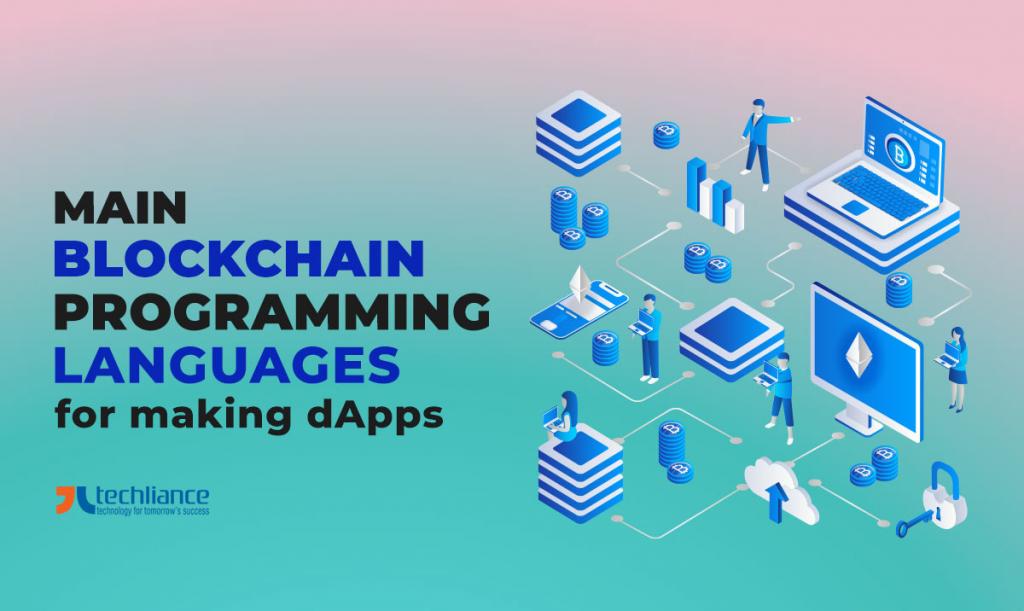
Core computer languages perfect for Blockchain development
Here are the top blockchain programming languages from the general-purpose class for dedicated teams to select.
- Python
- JavaScript
- Ruby
- Java
- C#
- PHP
- C++
- SQL
Let’s have a look at these high-level blockchain programming languages that are ideal for creating distributed applications in 2024.
Python
Nowadays, Python is the go-to programming language for creating powerful apps regarding data analysis. It’s considered one of the best languages for not just web development, but also IoT app and enterprise development. And yes, Python is a great asset for blockchain development as well.
Created in 1991, Python is widely used for dApps and smart contracts development. Also, the finest part is that it’s a very easy-to-learn computer language. This is a big incentive for a lot of developers to pick up on Python. Therefore, businesses find blockchain development in Python relatively easier to pursue.
Python also offers these benefits for Blockchain development.
- Access to dynamic architecture
- Perfect for both base and scripting approaches
- Open-source support
- Efficient prototyping (enables developers to visualize applications as per requirements)
JavaScript
Remember, JavaScript is amazing for web, app, and game development. The best thing about JavaScript is the fact that it has a wider number of JS frameworks. For example, Angular, ReactJS, VueJS, BackboneJS, NodeJS, etc.
JavaScript has progressed to become one of the best Blockchain programming languages in recent years as well. Its frameworks and JS libraries have extensive support for Blockchain development. Due to its all-embracing nature, JavaScript is often used in big companies and corporations.
JS efficiently powers contracts in NEO. So, thanks to it, NEO can handle even thousands of transactions per second. Some great points for JavaScript blockchain development include the following.
- Simpler and earlier entry into the market
- Enhanced scalability
- No hassle of integration of respective resources
Ruby
As a productivity-centric language, Ruby is among the leading blockchain programming languages. Ruby was started in the 1990s, mainly as a general-purpose language for developers to head start their vision for applications. Also, it has a great capacity to integrate with third-party APIs and plug-ins.
If you are a newbie developer, then this is probably the first language to explore for building blockchain applications. On top of that, Ruby has great depth in collaborating with other computer languages. It gives an overall opportunity to mix features and build an application based on an enhanced platform. As a result, you can craft some amazing blockchain-based software and platforms.
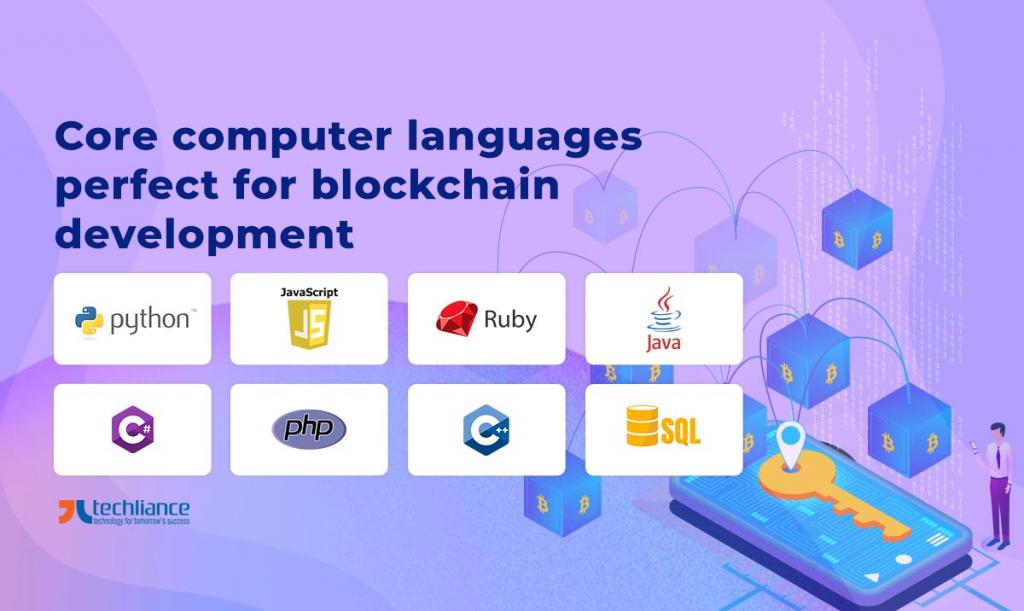
Java
Moving through the list of blockchain programming languages without the name of Java is impossible. Java has been the king of computer languages for over 2 plus decades. Also, it is one of the three official languages for Android mobile development.
Moreover, backend development usually takes place in Java. Therefore, it is no surprise that Java is also thought amongst one of the chief blockchain programming languages. Derived from C-syntax, Java has helped to build sophisticated smart contracts and dApps.
Some of the qualities for Java include these advantages.
- Robust support for OOP methodology
- Easiness of memory cleaning
- Availability of ample libraries
- Development in the lesser time frame
Few of the blockchain solutions built on Java are as follows.
- NEM
- IOTA
- NEO
- Hyperledger Fabric
C#
Coming next in our list of blockchain programming languages is C# with a plethora of extensive features. It has decent capabilities for enterprise-centric, cloud, and cross-platform applications. Accordingly, these aspects make it a good fit for blockchain development.
Created by Microsoft, C# comes loaded with features from C++ and bundles them with SQL and .NET platform. C# is widely used for developing dApps, smart contracts, and infrastructure in a blockchain environment. So, C# provides you with several recompenses including these.
- Its open-source nature makes it easily accessible for anyone
- C# has massive identicality with both C++ and Java
- Syntax of C# is easy to understand and learn
- C# empowers blockchain developers to write portable code across devices
PHP
Is anyone not familiar with PHP? The name resonates as it is one of the most popular computer languages for website development. Once, standing for personal home page, PHP refers to the recursive acronym of Hypertext Preprocessor. It has been around the IT industry since 1995.
PHP is also regarded as a famous blockchain programming language for building distributed applications. It has a great capacity to encompass the complexities of various scales. Thus, it can create features that are par level in the market.
The rewards that PHP delivers for blockchain development are these.
- Extensive open-source community
- Object-oriented with powerful features
- Large developer community
- Greater support for better development
C++
Students of computer science, software development, and IT have the fondest memories with the C++ computer language. Because it introduced the majority of tech geeks to the world of object-oriented programming. C++ made us code our first program in the form of “Hello World”.
Realize that C++ is way more productive than just learning to code. Subsequently, C++ has transcended into one of the high-demand blockchain programming languages for cryptocurrency development and decentralized applications. C++ is the language powering some of the widespread blockchains in the financial sector including these.
- Bitcoin
- Litecoin
- Ripple
- Stellar
- EOS
C++ presents some great features such as the following.
- Efficient CPU management and memory control
- Code isolation for different data structures
- Ease of running parallel/non-parallel threads
- Option to move semantics for copying data effectively
- Compile-time polymorphism for enhanced performance
SQL
Structured Query Language (SQL) works as the base of database management systems like Oracle, MYSQL, and Microsoft SQL Server, etc. SQL was originally designed at IBM for enhanced communication with databases around 1974. Often just reckoned as the query language for databases, SQL is a lot more than that.
SQL has greater capacity in terms of managing and manipulating data as well as superior security controls. Nevertheless, SQL has transcended into creating secure and effective enterprise-level solutions under the Blockchain domain. So, these features turn SQL the right fit for listing into the premier blockchain programming languages.
One of the optimal examples of this is Aergo, which is an open-source enterprise blockchain platform optimized for hybrid deployments. It consists of both permissioned and permissionless blockchain architectures. Likewise, Aergo has support for SQL that makes data handling familiar for developers programming smart contracts.
Specialized coding languages for creating smart contracts
Here are some special-purpose blockchain programming languages for building smart contracts within 2024.
- Solidity
- Clarity
- Simplicity
- Vyper
- Liquidity
- Bitcoin Script
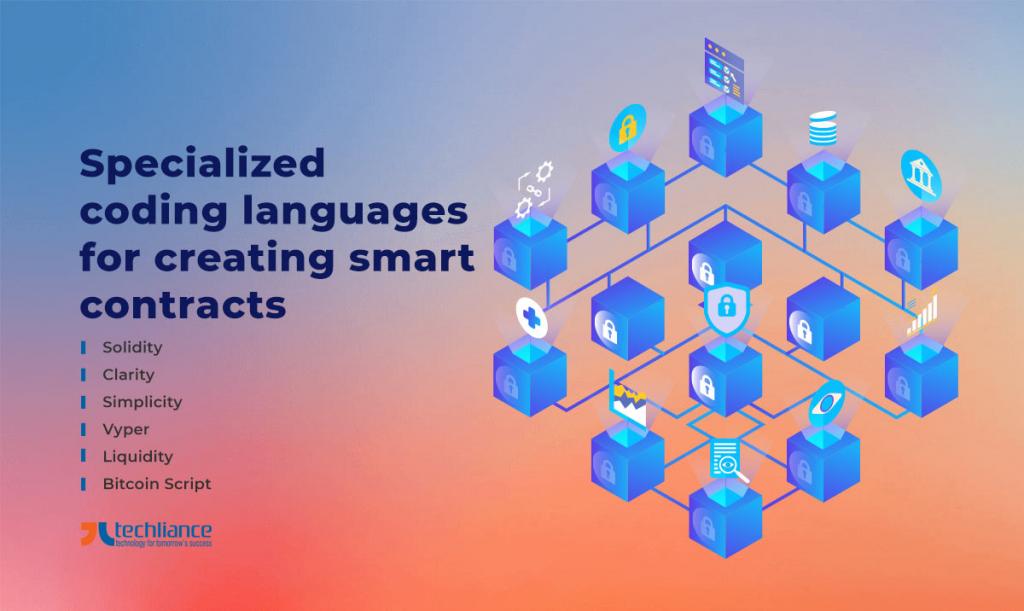
Next, we briefly glance over a few of these blockchain programming languages for smart contracts.
Solidity
Some computer languages are based on concepts from others. Solidity is one of them. It is heavily influenced by JavaScript, PowerShell, and C++. Solidity is mostly used when you want to develop dApps or any ICO development game.
The best thing about Solidity is that it was developed by Vitalik Buterin. Does the name sound familiar? He is co-founder of Ethereum, one of the prevalent blockchains across the globe and in the United States.
Solidity allows a very easy approach for developers to learn the language. Also, its relation with Ethereum makes it best for blockchain development. Developers can create the required features with great accuracy.
The salient features of Solidity are as follows.
- Accessibility to JavaScript infrastructures, debuggers, and other tools
- Statically typed programming
- Possibility of inheritance properties in smart contracts
Simplicity
The next name in the blockchain programming languages for creating smart contracts is Simplicity. This is a relatively newer language in comparison as it hit the market in November 2017. Despite its Turing incompleteness, the low-level nature and finitary function make it good for creating smart contracts.
Simplicity is based on Ivy and works with a Haskell-like syntax. Certainly, it turns coding in this language easy and effective. Some of the profits of Simplicity for blockchain development include these.
- Simplicity is highly mathematical at heart.
- It makes the code lines human-readable.
- Simplicity is highly used for developing smart contracts.
- Solutions work with Bitcoin and Ethereum Virtual Machine (EVM).
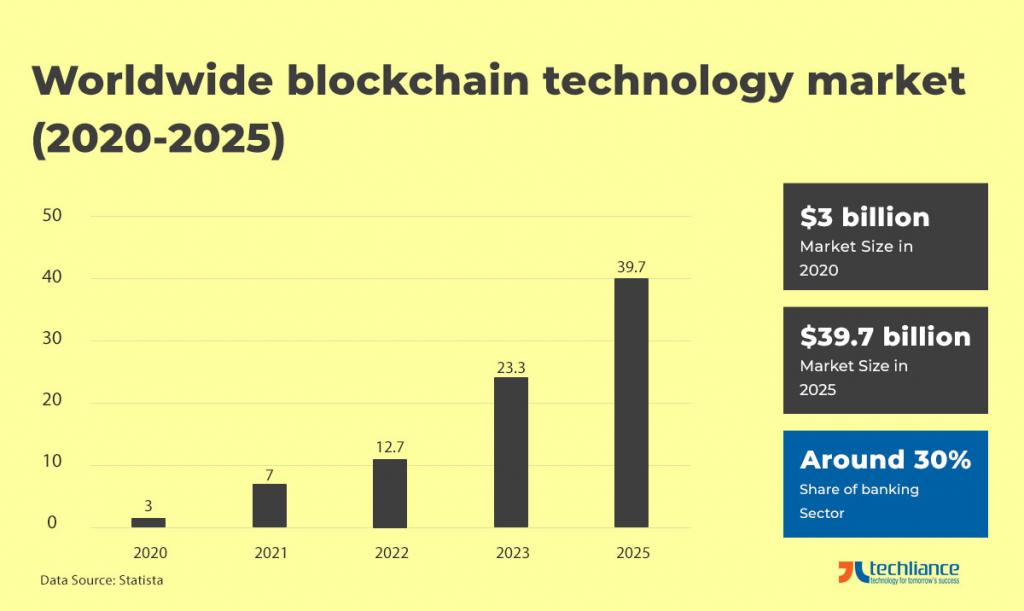
Statistics stressing the value of blockchain in business
In case, you are wondering about the status of blockchain, cryptocurrencies, and related concepts. Let’s not have any doubts about these revolutionary business ideas. Particularly, blockchain technology is here to stay through 2022 and in the future.
A study found the universal blockchain technology market at USD 3 billion by 2020. It estimates the blockchain technology market worldwide to accumulate $39.7 billion in revenue by 2024. Obviously, with around a 30% share, the banking sector is the biggest player in the blockchain market.
Financial companies can save up to $12 billion a year just by using blockchain. Additionally, blockchain as a cost-effective measure allows up to a 30% reduction in the banks’ infrastructure expenses. The number of registered blockchain wallets in 2022 was about 82 million.
Till 2025, blockchain integration in the healthcare industry will upsurge to $5.61 billion. Cryptocurrencies are volatile, but the rates for most of them remain high. People and businesses aiming for safe investments can count on Bitcoin, Ether, and stablecoins.
March 2022 saw the value of one Bitcoin hover over 42,000 USD. Few experts predict that a Bitcoin can be worth $100,000 by end of 2022. Whereas, some analysts forecast the price of 1 Bitcoin to range from $200,000 to a whopping $1 million by 2026.
All these statistics about blockchain are promising. They give the affirmation of this technology to remain a powerful asset for 2024 and decades to come. Correspondingly, this gives tremendous importance to the languages that enable businesses in developing blockchain software and applications.
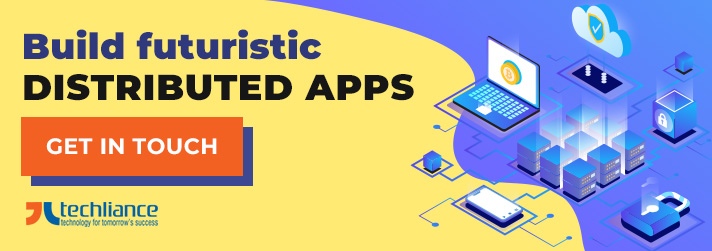
Conclusion
This is important for blockchain programming languages to be easy to learn and use by developers. Besides, they must capture intricate kinds of features to accommodate the requirements of data mining, security, and networking. Also, businesses must not feel it difficult to adapt the blockchain technology.
The computer languages listed in our article are majorly accomplished, while some are relatively new. However, they are driving some of the incredible, powerful, and common blockchain applications that are ruling the world. Furthermore, they are also setting in motion the leading cryptocurrencies. Hence, businesses must keep a special eye on catching more on these languages, to stay up-to-date.
Are you looking for some information, direction, or way of getting into the distributed applications? You are at the right spot because Techliance can cover you in the prevailing areas of futuristic technologies. Begin your journey in innovative software development like the blockchain domain with us now.




